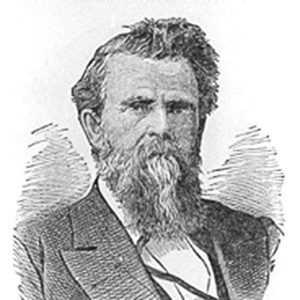calsfoundation@cals.org
James David Walker (1830–1906)
James David Walker served as a U.S. senator from Arkansas from 1879 to 1885. Before that, he served as a judge and as a colonel in the Confederate army. Local historian William Campbell later described him as “a man of strong convictions, sturdy honesty, high principles, and the recognized leader of the bar,” adding that his “knowledge and use of the law was profound, and his pleading before juries was always persuasive.” He had little impact in the Senate, however.
J. D. Walker was born on December 13, 1830, near Russellville, Kentucky, the fifth and youngest child of James Volney Walker and Susan Howard McLean Walker. On both sides of his family, he was related to politicians, including congressional representatives David Walker (his grandfather) and John McLean, as well as U.S. Senator George Walker. When he was seventeen, Walker moved to Fayetteville (Washington County) and lived in the household of distant relative Judge David Walker (not the congressional representative); in 1857, he married Walker’s daughter Mary. The couple had nine children, five of whom lived to adulthood.
Walker attended private schools in Kentucky and then was a student at the Ozark Institute near Mount Comfort (Washington County) and Arkansas College in Fayetteville. After studying law, he was admitted to the Arkansas bar in 1850 and began practice in Fayetteville. Just before the beginning of the Civil War, Walker was named a judge of the circuit court in the eighth circuit, but he resigned that position and was elected colonel of the Fourth Arkansas Infantry.
Walker was captured at the Battle of Wilson’s Creek on August 10, 1861, and he spent a year as a prisoner of war. In August 1862, he signed an oath promising not to take arms against the U.S. government and then joined his family in Corsicana, Texas, where he stayed for the remainder of the war. In the summer of 1865, the family returned to Fayetteville, where Walker resumed his law practice. Walker was named solicitor general, and he was one of Arkansas’s presidential electors in 1876, casting his vote for Democrat Samuel Jones Tilden.
When Stephen Dorsey chose not to stand for reelection as U.S. senator from Arkansas, Walker was one of five candidates considered for the position. Another candidate was Robert Ward Johnson, who had been a senator from Arkansas before the Civil War. On January 26, 1879, Walker was elected senator by the Arkansas General Assembly; on the same day, legislators began reporting that they had been offered bribes by supporters of Johnson. An investigation followed, but Walker, unaffected, proceeded to Washington DC, where he served in the U.S. Senate from March 4, 1879, until March 3, 1885. Overshadowed throughout his term by fellow Arkansan Senator Augustus Hill Garland, Walker received little attention, although he did return to Arkansas as part of a Senate committee investigating improvements to the Mississippi River. Walker told an Arkansas Gazette reporter that the committee was “well satisfied” with the improvements they had seen.
In January 1885, Walker announced that he would not seek reelection to the Senate, and instead he returned to his law practice in Fayetteville, in which he remained active until the day he died. One of his chief accomplishments was to assist the committee that created the Confederate Cemetery in Fayetteville.
On October 17, 1906, Walker fell down the stairs in the building where his law practice was located, fracturing his skull; he died a few hours later.
For additional information:
Campbell, William S. One Hundred Years of Fayetteville, 1828–1928. Fayetteville, AR: 1928.
“Colonel J. D. Walker of Fayetteville as a Prisoner of War.” Flashback 10 (January 1960): 15–17.
“Ex-U.S. Senator J. D. Walker Dead.” Arkansas Gazette. October 18, 1906, p. 2.
“Interesting Interview with Senator J. D. Walker on Topics of the Day.” Arkansas Gazette. November 17, 1883, p. 5.
Steven Teske
Encyclopedia of Arkansas History & Culture
 Politics and Government
Politics and Government Post-Reconstruction through the Gilded Age, 1875 through 1900
Post-Reconstruction through the Gilded Age, 1875 through 1900 James D. Walker
James D. Walker 




Comments
No comments on this entry yet.